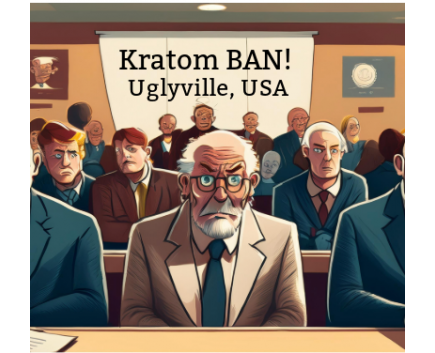
Several Small Towns Move to Ban Kratom
Proposals to ban kratom have been introduced in several small towns across the United States.
Louisiana is a state known for extremely harsh laws for people who posses certain substances. Although kratom has yet to be outlawed, several parishes have taken it upon themselves to ban the sale of kratom and sometimes criminalize its consumers. A state with a 100% for-profit prison system, Louisiana sheriffs have lobbied to outlaw the plant.
Union Parish is the latest in Louisiana to propose a kratom ban. The Union Parish Police Jury unianimously voted to outlaw kratom on December 3, 2024, with the law to go into effect in 30 to 45 days.
In November, Ouachita Parish also banned kratom. Both parishes have only banned the "sale and distribution" of kratom, and have abstained from criminalizing consumers, according to brief news reports.
The Board of Health in Lowell, Massachusetts is considering a ban on kratom. The Board voted on October 2, 2024, to initiate the process of banning kratom, citing concerns about its potential for addiction and lack of FDA approval. The board also plans to support a state-wide ban on kratom sales. The proposed regulation would prohibit the manufacture, distribution, sale, or offering for sale of kratom products in Lowell. A public hearing was held on December 4.
In the Outer Banks of North Carolina, a Dare County council member called on his colleagues to draft a resolution urging the state to ban kratom, lumping the plant in with tianeptine and phenibut. Resolutions have no effect on the law, but they may influence North Carolina's lawmakers to further action.
Small town councils often use misinformation to justify kratom bans, which can lead to misunderstandings about the substance. Here are some common examples:
Exaggerating Kratom Risks: Some councils claim that kratom is as dangerous and addictive as heroin or other opioids.
Lack of Regulation Equals Danger: Councils often argue that because kratom is not regulated by the FDA, it must be unsafe. However, many natural supplements are not FDA-regulated but are still widely used without significant issues.
Misleading Statistics: Some councils use statistics about kratom-related deaths without context, such as the presence of other substances in the system or underlying health conditions.
Fear-Mongering: Highlighting rare and extreme cases of kratom misuse to create fear and justify a ban, rather than considering the broader context and potential benefits of kratom for some users.
- Claiming a Lack of Resources: Many town councils have claimed they do not have the resources to regulate a local kratom market, despite funding police raids, arrests, and incarceration of kratom consumers.














Comments
Leave your comment